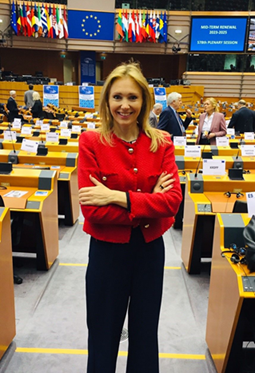Czech Business Today
EESC CORNER: The EU Should Take Inspiration from the Czech Model in Tackling Bureaucracy
The European Union has long struggled with bureaucracy, which burdens businesses across the continent. Many entrepreneurs consistently cite regulatory changes as one of the most significant administrative burdens. With each new legislative adjustment, companies must familiarize themselves with new rules, understand their obligations, and adapt their operations and technology accordingly. This often requires new investments and diverts attention away from true innovation and competitiveness. Furthermore, more and more businesses are hiring additional staff or paying consultants to manage the filing of various reports and data submissions to authorities, rather than focusing on growth. This represents the bureaucratic load – time and money that could be better spent on advancing business operations.
Entrepreneurs highlight that a major issue is the repeated demand for the same information in different forms. The lack of clarity on how these details are used only adds to their frustration. Some argue that if authorities had to pay for the data they collect, they might think more carefully about the efficiency of their information-gathering processes, saving businesses unnecessary costs.
When the European Commission prepares new proposals, it usually includes an analysis of their projected impact, often downplaying the consequences and claiming they will be marginal. However, in practice, the cumulative effect of multiple regulations simultaneously hitting a business is often overlooked. Entrepreneurs are left unsure whether a new regulation is the “last straw” that will break the camel’s back, particularly when they lack a holistic view of how various regulations impact them.
While the EU touts high levels of investment in research and development, its competitiveness on the global stage is at risk. In 2021, European companies spent 270 billion EUR less on research and development than their American counterparts. This gap is alarming and reflects how bureaucracy in Europe is increasingly discouraging innovation and weakening the region’s ability to compete with global rivals.
Statistics show that between 2008 and 2021, over 30% of European “unicorns” (startups valued at over a billion dollars) moved their headquarters outside the EU. The reasons include not only market fragmentation and limited access to capital, but also burdensome bureaucracy. A recent European Investment Bank survey found that 61% of respondents saw EU regulations as a barrier to long-term investments.
Given this context, the question arises: how can regulation be improved to reduce the administrative burden on businesses? The EU could take inspiration from the Czech model, which has focused on simplifying legislation in recent years. Six years ago, the Czech Chamber of Commerce proposed that lawmakers include obligation tables alongside legal texts to help businesses navigate complex regulations. This summary should clearly outline the obligations, deadlines, and periodicity, saving time and money on legal services.
In order to tackle bureaucracy effectively, the Czech Chamber of Commerce created an innovative app that provides entrepreneurs with a daily overview of their obligations and how to fulfil them. The app is tailored to specific industries and company sizes, allowing businesses to access real-time information on regulatory compliance. This approach could serve as a model for the EU, as it helps both companies and regulators avoid duplications and contradictions in rules.
With today’s available digital tools and AI technology, there is an opportunity to adopt a new regulatory approach that simplifies and clarifies administrative processes. The Czech model shows that bureaucracy can be reduced without compromising the effectiveness of regulation. European institutions should consider this approach, especially in light of the upcoming EU leadership cycle. Entrepreneurs in the EU need support that enables them to focus on innovation and competitiveness, not on paperwork.

Source: Alena Mastantuono, Member of the EESC





